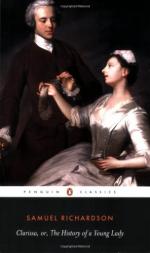There is no fear that attempts could be formed by the most audacious [two Lovelaces there cannot be!] upon a character so revered for virtue, and so charmingly spirited, as Miss Howe’s: yet, to have any man encouraged to despise a husband by the example of one who is most concerned to do him honour; what, my dear, think you of that? It is but too natural for envious men (and who that knows Miss Howe, will not envy Mr. Hickman!) to scoff at, and to jest upon, those who are treated with or will bear indignity from a woman.
If a man so treated have a true and ardent love for the woman he addresses, he will be easily overawed by her displeasure: and this will put him upon acts of submission, which will be called meanness. And what woman of true spirit would like to have it said, that she would impose any thing upon the man from whom she one day expects protection and defence, that should be capable of being construed as a meanness, or unmanly abjectness in his behaviour, even to herself?—Nay, I am not sure, and I ask it of you, my dear, to resolve me, whether, in your own opinion, it is not likely, that a woman of spirit will despise rather than value more, the man who will take patiently an insult at her hands; especially before company.
I have always observed, that prejudices in disfavour of a person at his first appearance, fix deeper, and are much more difficult to be removed when fixed, than that malignant principle so eminently visible in little minds, which makes them wish to bring down the more worthy characters to their own low level, I pretend not to determine. When once, therefore, a woman of your good sense gives room to the world to think she has not an high opinion of the lover, whom nevertheless she entertains, it will be very difficult for her afterwards to make that world think so well as she would have it of the husband she has chosen.
Give me leave to observe, that to condescend with dignity, and to command with such kindness, and sweetness of manners, as should let the condescension, while in a single state, be seen and acknowledged, are points, which a wise woman, knowing her man, should aim at: and a wise woman, I should think, would choose to live single all her life rather than give herself to a man whom she thinks unworthy of a treatment so noble.
But when a woman lets her lover see that she has the generosity to approve of and reward a well-meant service; that she has a mind that lifts her above the little captious follies, which some (too licentiously, I hope,) attribute to the sex in general: that she resents not (if ever she thinks she has reason to be displeased) with petulance, or through pride: nor thinks it necessary to insist upon little points, to come at or secure great ones, perhaps not proper to be aimed at: nor leaves room to suppose she has so much cause to doubt her own merit, as to put the love of the man she intends to favour upon disagreeable or arrogant trials: but let reason be the principal guide of her actions— she will then never fail of that true respect, of that sincere veneration, which she wishes to meet with; and which will make her judgment after marriage consulted, sometimes with a preference to a man’s own; at other times as a delightful confirmation of his.




